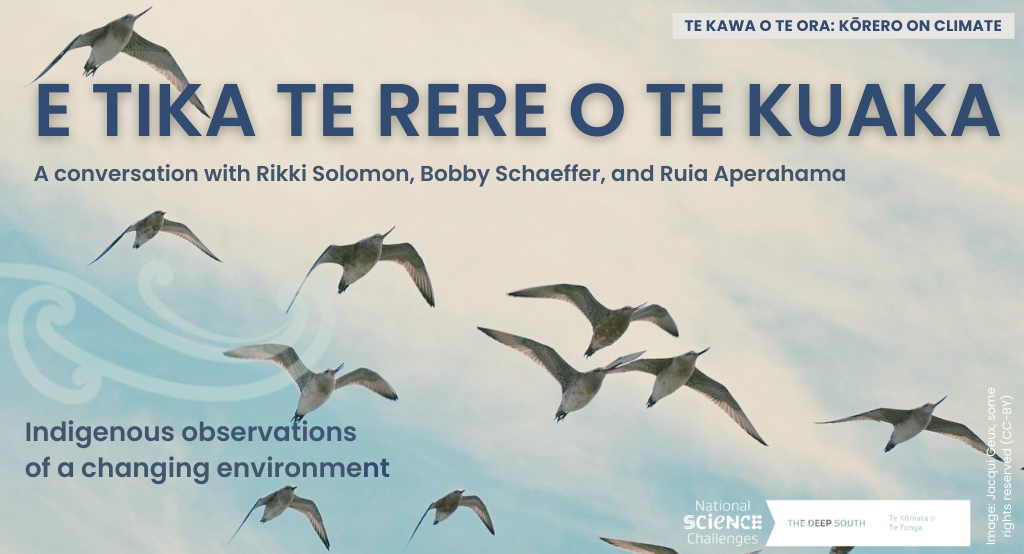Wednesday, September 28, 2022
12:00pm - 1:30pm
Location
Virtual hui: To participate via Zoom, please register in advance
Webinar: E tika te rere o te kuaka
The kuaka flies direct: Indigenous observations of a changing environment

We are honoured to bring you this online kōrero with Rikki Solomon (Aotearoa) and Bobby Schaeffer (Alaska). We are also extremely lucky that our Kāhui member and Pou Tikanga (he tūranga hou) Ruia Aperahama will facilitate the kōrero.
This webinar takes its name from the whakatauki about the kuaka (godwit), who connects the two lands of Aotearoa and Alaska. In Māori understandings, the cries of the kuaka are loud as they migrate between Alaska and Aotearoa, a flight of 12,000km. Ancestors navigating the moana observed their course during the day and listened to their cries at night to guide them.
In this webinar, we bring together Indigenous experts Rikki Solomon (Ngāti Kahungunu, Ngāti Kahu ki Whangaroa, Rangitāne-o-Tamaki-nui-a-rua) and Bobby Schaeffer (Iñupiaq), to guide a different kind of climate change conversation. Our speakers bring vital, place-based knowledge, and experiences of change that spring from and are centred around the environment. Research, conversation and action around climate change has much to learn from this relational and experiential approach, steeped in ancestral wisdom and practice.
Like the direct flight of the kuaka, we hope that this webinar will inspire us to clear a pathway into the future, based on learnings and patterns that are ancient in origin.
Ka ngau ki te turikakao te paringa o te tai, e tika te rere o te kuaka.
The spinifex wanders along the beach like the incoming tide, the kuaka flies direct.
This critical conversation is part of our Te Kawa o Te Ora webinar series. A recording of this webinar will be available on our YouTube channel soon after. Please subscribe to our newsletter to stay up-to-date.
ABOUT OUR PRESENTERS
Rikki Solomon
Ko Takitimu, me Māmaru, me Kurahaupō ngā waka.
Ko Orangi, me Omanuwhiri, me Ruahine ngā maunga.
Ko Te Ewe, me Waimahana, me Manawatu ngā moana.
Ko Ngāti Kahungunu, Ngāti Kahu ki Whangaroa, Rangitāne-o-Tamaki-nui-a-rua ngā iwi.
Ko Ngāi Te Ipu, me Ngāti Aukiwa, me Ngāti Pakapaka ngā hapū.
Ko Rikki Solomon tōku ingoa.
Rikki has over 25 years of experience working in the tangihanga industry as a kaimanaaki tūpāpaku (embalmer) and kaiatawhai (funeral director). Rikki also works as part of the Aronui team at Turuki Health Care and facilitates the maramataka wānanga with whānau. He also is a mataora (change agent) who practices the principles of Mahi-a-Atua within Te Kurahuna, facilitating the Maramataka.
Rikki is a graduate of He Waka Hiringa, Te Wānanga o Aotearoa. He is currently working towards his Doctorate of Indigenous Development and Advancement at Te Whare Wānanga o Awanuiārangi. His focus is on Ngā Kitenga o te Maramataka: Insights into the Maramataka (Māori lunar calendar) and its relation to whakamomori (suicide).
Robert (Bobby) Schaeffer
Robert was born in Kotzebue, Alaska, and has lived in and near Kotzebue his entire life. From a young age, he learned about the environment from his dad and other elders. He grew up hunting, fishing and trapping. He has spent a lot of time on the waters and ice of Kotzebue Sound, fishing commercially and observing the fish, animals and sea ice physics. He has been involved with marine-based research with the Native Village of Kotzebue for many years and has contracted under State, Federal, and private marine mapping and other oceanography research projects. He is currently Chairman for the Native Village of Kotzebue Tribal Council.
Ruia Aperahama
Ruia (Ngāti Pikiahu, Ngāti Waewae, Ngāti Tūtemohuta, Tūrangitūkua, Ngāti Kurī, Te Aupouri, Pohutiare, Ngāti Kahu, Muriwhenua, Ngāti Whātua) is an award-winning singer, songwriter, visual artist and illustrator, respected for his knowledge of Tikanga and Te Reo Māori. He has over 30 years in the New Zealand music, entertainment and broadcasting industries and teaching experience from primary to community polytechnics and universities, as a teacher, lecturer, researcher and motivational speaker. Ruia is currently a member of the Kāhui Māori for both the Deep South Challenge and the Antarctic Science Panel. He is a leader in tribal and pan-tribal unity for social, spiritual, cultural, and economic entrepreneurship and nation building.